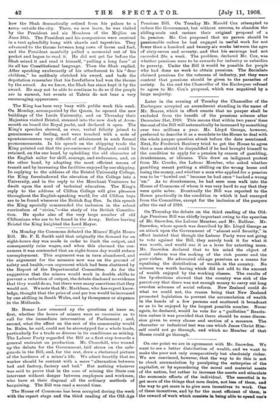Later in the evening of Tuesday the Chancellor of the
Exchequer accepted an amendment standing in the name of Mr. Soares, which in effect enacts that no pauper shall be excluded from the benefit of the pensions scheme after December 31st, 1910. This means that within two years' time the cost of the Bill will automatically be increased by something over two millions a year. Mr. Lloyd George, however, preferred to describe it as a mandate to the House to deal with the whole pauper question afresh before the date mentioned. Next, Sir Frederick Banbury tried to get the House to agree that a man should be disqualified if he had brought himself to the condition to apply for a pension by reason of gambling, drunkenness, or idleness. This drew an indignant protest from Mr. Crooks, the Labour Member, who asked whether. gambling meaut putting a shilling on the wrong horse and losing the money, and whether a man who applied for a pension was to be "howled out" because he had once "backed a wrong 'un." As to drunkenness, he had seen men walk into the House of Commons of whom it was very hard to say that they were quite sober. Eventually the Bill was reported to the House practically in the condition in which it had emerged from the Committee, except for the inclusion of the paupers after the end of 1910.






































 Previous page
Previous page